The IP-IO module device can be installed on a DIN rail or other flat surface inside a cabinet.
A DIN rail is a common and convenient technique for installing the IP-IO module along with other associated control and monitoring devices. The most efficient ventilation is achieved with the wall-mounted DIN rail oriented horizontally and with adequate space provided between the IP-IO module rail and adjacent rails or other panel-mounted devices.
The IP-IO module is typically installed horizontally (on a DIN rail going from left to right), with the device label text in the upright position reading left to right.
action_zoom_plus_stroke
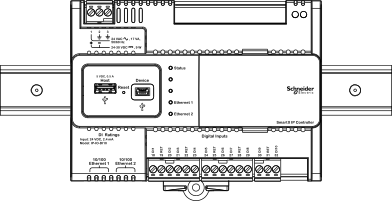
IP-IO module installed on a horizontal DIN rail
The restrictions on installing the device in other orientations differ depending on the operating conditions.
|
Notice
|
|
CONTROLLER DEVICE DAMAGE
Follow the installation orientation restrictions that apply to the specific BACnet/IP device.
Failure to follow these instructions can result in equipment damage.
|
Under normal operating conditions of 0 to 50 °C (32 to 122 °F), the IP-IO module can be installed in the following orientations:
Horizontally (on a DIN rail going from left to right), with the device label text in the upright position reading left to right. See “a” in the following figure.
Vertically (on a DIN rail going from top to bottom), which means that the device is rotated +90 degrees or -90 degrees from the horizontal position. See “b” and “c” in the following figure.
Installing the IP-IO module rotated 180 degrees from the horizontal position with device label text up and down (“e” in the figure), face down from a ceiling (“d” in the figure), or face up on a horizontal surface (“f” in the figure) is not supported.
action_zoom_plus_stroke
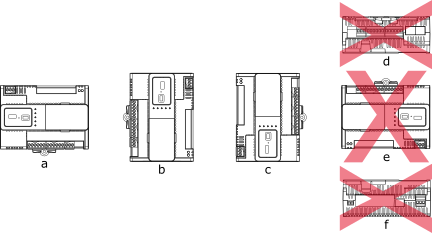
Installation orientation restrictions for the IP-IO module operated in normal conditions, 0 to 50 °C (32 to 122 °F)
When the IP-IO module is used for rooftop applications, -40 to +60 °C (-40 to +140 °F), the device should be installed horizontally, with the device label text in the upright position reading left to right. See “a” in the following figure. Any other installation orientation (“b”, “c”, “d”, “e”, and “f” in the figure) may exceed the IP-IO module's thermal specifications, which can damage the module.
action_zoom_plus_stroke
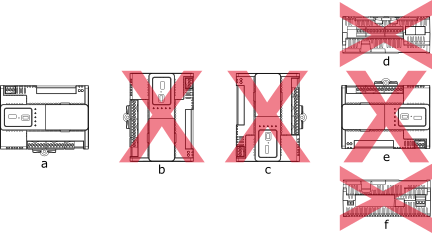
Installation orientation restrictions for the IP-IO module operated at -40 to +60 °C (-40 to +140 °F)
The IP-IO module can be installed in a standard DIN enclosure.
When installing IP-IO modules in a cabinet, it is recommended to provide ample space between the DIN rails and modules for sufficient ventilation.
action_zoom_plus_stroke
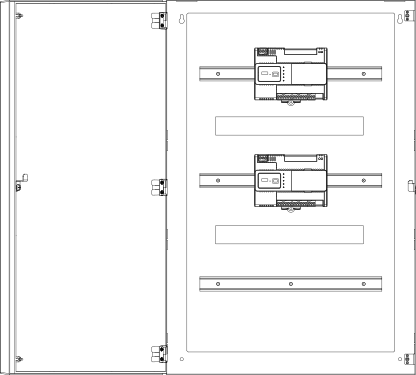
IP-IO modules installed on horizontal DIN rails in a cabinet
To help prevent the device from sliding down or sideways on the DIN rail, install an end clip for DIN 35 (part number SXWDINEND10001) tightly against the bottom or rightmost device on the rail. The end clip is easily removed if you bend the snap lock open with a screwdriver.
|
Notice
|
|
Equipment damage
Use an end clip (part number SXWDINEND10001) when you install the device on a vertical DIN rail.
Failure to follow these instructions can result in equipment damage.
|
action_zoom_plus_stroke
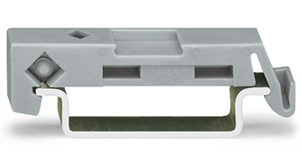
End clip for DIN 35 fixed across the DIN rail
The IP-IO module is delivered with terminal blocks installed on the device.
The terminal blocks are removable. You can replace an IP-IO module in seconds because no terminal wiring is affected. The only exception is the high power relay output on the IP-IO-UIO5DOFA4 model, which uses a two-position fixed terminal block due to current requirements.
All IP-IO module models can be equipped with MP-C Display (part number SXWMPCDSP10001), which is an add-on module that enables manual override control of analog and digital outputs. The module consists of an LCD display and keys. The module is designed for permanent installation.
action_zoom_plus_stroke
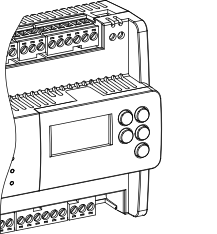
MP-C Display installed on an IP-IO module
Do not try to remove the MP-C Display module as it may damage the enclosure and the module. Once installed, the MP-C Display module cannot be removed.
|
Notice
|
|
CONTROLLER DEVICE DAMAGE
Do not try to remove the MP-C Display module.
Failure to follow these instructions can result in equipment damage.
|

 IP-IO Module Device Installation
IP-IO Module Device Installation
 IP-IO Module Screw Terminals
IP-IO Module Screw Terminals
 IP-IO-DI10 Screw Terminals
IP-IO-DI10 Screw Terminals
 IP-IO-UIO10 Screw Terminals
IP-IO-UIO10 Screw Terminals
 IP-IO-UIO5DOFA4 Screw Terminals
IP-IO-UIO5DOFA4 Screw Terminals
 Wiring
Wiring
 Installing a Terminal Block on an IP-IO Module
Installing a Terminal Block on an IP-IO Module
 Removing a Terminal Block from an IP-IO Module
Removing a Terminal Block from an IP-IO Module
 Powering Up an IP-IO Module
Powering Up an IP-IO Module






 Danger
Danger
 Caution
Caution